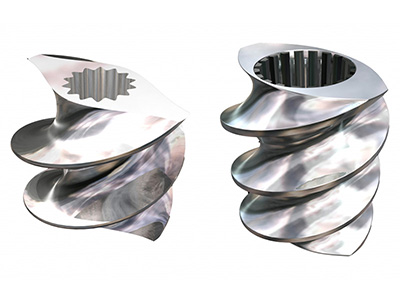Copyright © Shanghai Omega Machinery Co., Ltd. All rights reserved.
What material is used for screw elements?
Mar 20,2024
Tool Steel (e.g., H13, D2): Tool steels are popular choices due to their high hardness, toughness, and wear resistance. They can withstand high temperatures and mechanical stresses encountered in processing various materials.
Nitrided Steel: Nitriding involves introducing nitrogen into the surface of steel to improve hardness, wear resistance, and corrosion resistance. Nitrided steel screw elements are suitable for processing abrasive materials and offer extended service life.
Tungsten Carbide: Tungsten carbide is a hard and wear-resistant material often used in high-wear applications. Screw elements made from tungsten carbide or with tungsten carbide coatings can withstand abrasive materials and harsh processing conditions.

Ceramic: Ceramic screw elements offer exceptional wear resistance and can withstand high temperatures. They are suitable for processing highly abrasive or corrosive materials, although they may be more brittle compared to metal alternatives.
Hardened Steel Alloys: Various hardened steel alloys with specific compositions and heat treatments are utilized to manufacture screw elements, offering a balance of hardness, toughness, and wear resistance.
Powder Metallurgy Alloys: Powder metallurgy techniques allow for the creation of alloys with tailored properties, including high wear resistance and good mechanical strength. These alloys can be customized for specific applications.
The selection of material depends on factors such as the type of material being processed, processing conditions (temperature, pressure, etc.), desired throughput rates, and expected service life. In many cases, a combination of materials or surface treatments may be used to optimize performance and longevity.
Prev News Next News
- Information
- What are the reasons for the bending and deformation of extruded plates? How can they be solved?
- What are the causes and solutions for uneven edges when extruding sheet materials?
- How to solve the problem of stripes appearing on the surface when producing ABS composite boards?
- What causes the appearance of pits and bubbles on the surface of ABS/PMMA co-extruded composite sheets? How can it be solved?
- Why does overflow occur at the exhaust port of the extrusion main machine when producing ABS multi-layer composite plates? How should it be handled?
- What are the differences in the process when producing UPVC pipes by directly extruding PVC granules and powder?
- How should one select the molding equipment when generating PP water supply pipes?
- Why do the surfaces of extruded profiles have weld marks when extruding? What are the solutions to eliminate these marks?
- Why do large, dull and unreflective bubbles appear on the surface of the special profiles? How can this problem be solved?
- What causes the uneven surface and poor gloss of the sheet during the sheet extrusion process? How can it be solved?
- Contact Us

-
Shanghai Omega Machinery Co., Ltd.
Add.: No.168 Hualian Road, Putuo District, Shanghai City
Contact: Nina
Tel.: +86-021-69921527
Mobile: +86-15021464410
Fax: +86-021-69921567
E-mail: omegajessica@163.com;965425705@qq.com
WeChat No.: 1131449532
Whatsapp: +86 159 0054 6558

-